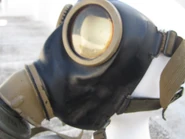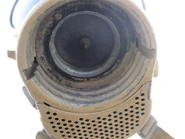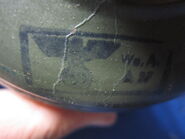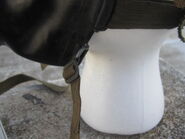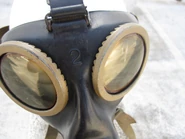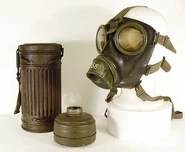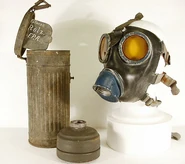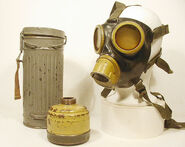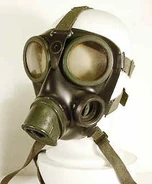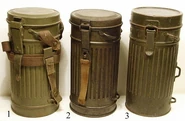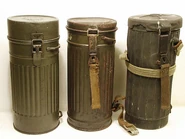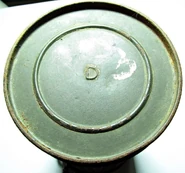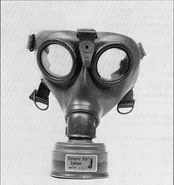(corrections) |
m (grammar) Tag: Visual edit |
||
| (12 intermediate revisions by 4 users not shown) | |||
| Line 1: | Line 1: | ||
| + | {{WIP}} |
||
| − | {{Mask|name = |
+ | {{Mask|name = GM38|previous = [[GM30]]|thread = {{Thread|DIN}}|image = Intro 010.jpg|next = [[GM54]] (BRD, Austria) |
| ⚫ | |||
| − | |||
| ⚫ | |||
| ⚫ | The |
||
| − | |||
| − | After the SOcond World War, some gas masks were in limited use with Austria. And a special variant of this mask was used by pilots. It had a hose on the left/right (depending on the aircraft it was used in). |
||
| − | |||
| ⚫ | |||
| − | The filter thread is 40mm and the filter is quite heavy and the frontal weight pulls the mask forward. |
||
| − | |||
| ⚫ | |||
| ⚫ | |||
| − | |||
| ⚫ | |||
| + | [[ShM-41|SchM-41-M]] (DDR)|country = {{country|de-n}}|period = 1938-1945|issued = {{user|de-wh}} |
||
| ⚫ | |||
| ⚫ | |||
| + | ===GM38=== |
||
| ⚫ | The facepiece was made entirely from rubber. The metal parts on this mask have a variety of colours, which represent why they were used. Masks with tan painted parts were used in the tropics of Africa in World War II as it is painted in 'sand colours'. The mask has a 5-pointed strap harness which is tightened with two straps in the mid-section and another two near the bottom. The mask was issued in a canister which was carried around the neck but the mask also has its own carrying strap with which it could be carried. |
||
<gallery columns="3"> |
<gallery columns="3"> |
||
GM-38 005.JPG|Side- View |
GM-38 005.JPG|Side- View |
||
| Line 22: | Line 14: | ||
GM-38 003.JPG|Lenses |
GM-38 003.JPG|Lenses |
||
GM-38 004.JPG|Mask Size (2) |
GM-38 004.JPG|Mask Size (2) |
||
| − | GM38.01..jpg|Green painted |
+ | GM38.01..jpg|Green painted GM38 from Johannes' collection (http://gasmasklexikon.com/) |
| − | GM38.Fw..jpg|Blue Painted |
+ | GM38.Fw..jpg|Blue Painted GM38 from Johannes' collection (http://gasmasklexikon.com/) |
| ⚫ | |||
| + | </gallery> |
||
| + | ===GM38 Luftwaffe=== |
||
| + | The Luftwaffe had an additional, lateral round thread connection, depending on the aircraft type, right or left, with corrugated hose or filter. Depending on requirements, the unneeded connection was sealed with a round threaded plug. These masks were not crew equipment but remained in the aircraft. |
||
| + | <gallery> |
||
GM38.Lw..jpg|Air force GM- 38? from Johannes' collection (http://gasmasklexikon.com/) |
GM38.Lw..jpg|Air force GM- 38? from Johannes' collection (http://gasmasklexikon.com/) |
||
| ⚫ | |||
</gallery> |
</gallery> |
||
| + | ===GM38 Funker/Mikrofon=== |
||
| + | Very rare variant. It had a removable metal cap on the side into which the microphone was screwed. It was issued for radio operators. |
||
| ⚫ | |||
| + | The mask was issued with many different filters varying on the users. The Civil Defence used it with S-Filter. The armed forces used various filters, mainly FE 37, FE 41 and FE 42. In general, all filters were round canister filters painted in green colors. |
||
| + | |||
| + | Markings: |
||
| + | *FE: combat filter |
||
| + | *Fe: ferrum (iron) |
||
| + | *AL: aluminium |
||
| + | *NM: not magnetic |
||
| + | *R: Drinked Improved Ring-shaped Nebula Filter (In older filter-tops the R was stamped, in the newer ones) soaked = hexamethylenetetramine Refilled |
||
| + | *HN: hexamethylenetetramine Refilled |
||
| + | *Tp, Tr or Tropics: tropical filter |
||
| + | <gallery> |
||
| + | FE.jpg|The most common filters from left to right: FE, S-Filter, FE 37, KF 455, FE 41, FE 42 and CO FE 39 |
||
| + | </gallery> |
||
| + | |||
| + | ==Carrying canister== |
||
| + | The mask came in a round steel canister called Gasmaskenbüchse (gas mask canister). On the inside of the lid, there is a separated section for the anti-fog inserts. |
||
| + | |||
| + | The GM38 was issued with the fourth, tall, type canister. The other canisters remained service at the same time with GM30 masks, getting gradually replaced with newer canister as the war progressed. |
||
| + | |||
| + | First model Reichswehr and Wehrmacht canisters used between 1930-35 are around 26 cm high with a diameter of around 12 cm. |
||
| + | |||
| + | The second model used between 1935-36 is a bit shorter at 25 cm. The diameter remains the same. The closure system changed, adding a canvas pull strap for easier opening. |
||
| + | |||
| + | The third model used between 1936-38 has an updated closure system again, which remains the same for all following models. The dimensions are the same as the second model. |
||
| + | |||
| + | The fourth model (1938-45) keeps all the hardware features of the third, but is longer (around 27 cm) to better accommodate the rubber GM38 mask. |
||
| + | |||
| + | Early versions of the fourth and previous types are not waterproof, later variants however are. A waterproof canister is marked with a "D" for Dicht ((water)tight) on the bottom. |
||
| + | |||
| + | <gallery> |
||
| + | Armee.02.jpg|Canisters from 1936, 1938 and 1935. |
||
| + | Armee.01.jpg|Canisters form 1940 and 1941. |
||
| + | nemet-ii-vilaghaborus-gazalarc-henger-eredeti-festessel-szurovel-1ft-nma-909a_5_big.jpg|Waterproof canister with the "D" marking. |
||
| + | </gallery> |
||
| ⚫ | |||
| + | The mask was used for protecting the user's face from the backblast of the rocket leaving the tube of the RPzB 54 Ofenrohr ("stove pipe" - early Panzerschreck without protecting shield). |
||
| + | |||
| + | In concentration camps like Auschwitz the mask was used by the guards when dealing with Zyklon B, it required a special "J" filter. |
||
| + | <gallery> |
||
| + | pz101.jpg|German soldier aiming with an RPzB 54 Ofenrohr while wearing a GM38. |
||
| + | gassmaske.jpg|GM38 with "J" filter against Zyklon B. |
||
| + | </gallery> |
||
| + | |||
| ⚫ | |||
| + | |||
| ⚫ | |||
== References == |
== References == |
||
Revision as of 21:04, 7 March 2020
The GM38 was used by the German Army in the Second World War and was created as an upgrade for the GM30.
Overview
GM38
The facepiece was made entirely from rubber. The metal parts on this mask have a variety of colours, which represent why they were used. Masks with tan painted parts were used in the tropics of Africa in World War II as it is painted in 'sand colours'. The mask has a 5-pointed strap harness which is tightened with two straps in the mid-section and another two near the bottom. The mask was issued in a canister which was carried around the neck but the mask also has its own carrying strap with which it could be carried.
GM38 Luftwaffe
The Luftwaffe had an additional, lateral round thread connection, depending on the aircraft type, right or left, with corrugated hose or filter. Depending on requirements, the unneeded connection was sealed with a round threaded plug. These masks were not crew equipment but remained in the aircraft.
GM38 Funker/Mikrofon
Very rare variant. It had a removable metal cap on the side into which the microphone was screwed. It was issued for radio operators.
Filter
The mask was issued with many different filters varying on the users. The Civil Defence used it with S-Filter. The armed forces used various filters, mainly FE 37, FE 41 and FE 42. In general, all filters were round canister filters painted in green colors.
Markings:
- FE: combat filter
- Fe: ferrum (iron)
- AL: aluminium
- NM: not magnetic
- R: Drinked Improved Ring-shaped Nebula Filter (In older filter-tops the R was stamped, in the newer ones) soaked = hexamethylenetetramine Refilled
- HN: hexamethylenetetramine Refilled
- Tp, Tr or Tropics: tropical filter
Carrying canister
The mask came in a round steel canister called Gasmaskenbüchse (gas mask canister). On the inside of the lid, there is a separated section for the anti-fog inserts.
The GM38 was issued with the fourth, tall, type canister. The other canisters remained service at the same time with GM30 masks, getting gradually replaced with newer canister as the war progressed.
First model Reichswehr and Wehrmacht canisters used between 1930-35 are around 26 cm high with a diameter of around 12 cm.
The second model used between 1935-36 is a bit shorter at 25 cm. The diameter remains the same. The closure system changed, adding a canvas pull strap for easier opening.
The third model used between 1936-38 has an updated closure system again, which remains the same for all following models. The dimensions are the same as the second model.
The fourth model (1938-45) keeps all the hardware features of the third, but is longer (around 27 cm) to better accommodate the rubber GM38 mask.
Early versions of the fourth and previous types are not waterproof, later variants however are. A waterproof canister is marked with a "D" for Dicht ((water)tight) on the bottom.
External information
The mask was used for protecting the user's face from the backblast of the rocket leaving the tube of the RPzB 54 Ofenrohr ("stove pipe" - early Panzerschreck without protecting shield).
In concentration camps like Auschwitz the mask was used by the guards when dealing with Zyklon B, it required a special "J" filter.
Gallery

German GM-38 Gas Mask


